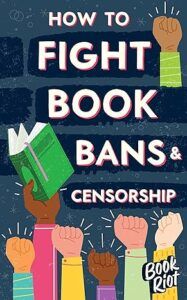Kelly Jensen is out this week, so Erica Ezeifedi and I are filling in on censorship news. Unfortunately, none of us can be Kelly, even with our forces combined, so we’re trying something a little different in the censorship news round-up. Instead of one big story and dozens of bullet points, we have each picked a few book ban stories this week to write a paragraph about — think Today in Books: Censorship Edition.
Don’t forget that today is the last day to get Book Riot’s ebook How to Fight Book Bans and Censorship on sale for $1.99. It compiles all of the most relevant censorship articles on Book Riot, including practical tips for fighting book bans as well as the historical context for where we are today. The content has also been updated, and there are some new additions, including visuals you can use to spread the word.
Kelly Jensen and I put this together alongside other Book Riot colleagues, and we’re proud of the result, which author Alex London calls “A vital resource for educators and librarians, and for communities who have had enough extremism and want the context and the tools to defend freedom of speech in our schools and libraries.”
Now, let’s jump into some of the biggest book censorship stories this week.
This Week’s Book Censorship News
Data Visualization of Banned and Challenged Books
USA Today posted a data visualization of the state of banned books in the country for Banned Books Week. If you’ve been following censorship news, none of it will come as a surprise, but seeing just how much challenges increased from 2019 to 2021 is staggering.
The map infographic also demonstrates that while Texas and Florida lead the charge in banning books, it’s not isolated to any one area: book bans have increased from coast to coast. Most of the books challenged are by BIPOC and/or LGBTQ authors.
Texas Law HB 900 is Still in Effect After Being Ruled Unconstitutional
Booksellers in Texas are in an uncomfortable limbo with House Bill 900, which would — among other things — require vendors to rate every single title ever sold to a public school for sexual content and submit those ratings to the government. Texas booksellers, alongside other groups, have challenged the bill. It is hard to see how it would be physically possible for any bookstore to uphold, given the number of titles they stock, even setting aside that ratings are up to interpretation and would vary wildly from vendor to vendor.
A judge’s order blocked the law, but an administrative stay has overruled that, meaning HB 900 is still in effect — despite a judge ruling it unconstitutional. Federal judge Alan D. Albright called it a “web of unconstitutionally vague requirements.” He went on,
“The government has the power to restrict the ability of its school district as to which books it may purchase. The exercise of these powers must, of course, comply with the requirements of the constitution, but these are powers that should be exercised by the state directly, not by compelling third parties to perform it or risk losing any opportunity to engage in commerce with the school districts.”
This administrative stay, which is usually used as a temporary measure to uphold the status quo, applies indefinitely, meaning booksellers have no idea when it will be overturned.
Librarians are Leaving the Profession Over Stress, Threats, and Accusations
In December 2022, Rockwell Falls, NY, youth services director Amanda Hoffman let the library board know that they were planning to do a Drag Story Hour in April. Bringing it up to the board wasn’t a requirement, but she decided to give them a heads up, knowing there would be some backlash. They were excited about the event.
By the time April came around, though, the board claimed they had been “in the dark” about the Drag Story Hour — despite meeting minutes showing Hoffman informed them. The public response was so vitriolic that the event was canceled, but that wasn’t enough. It started a cascade of criticism and investigations into the library. Hoffman was accused of being a pedophile and a child molester. “I had someone pray for me over the phone for Satan to leave my body,” she shared with The Post Star. She got a call from an FBI agent saying there had been a bomb threat against the library.
As Hoffman faced more and more harassment at work — on Facebook, over the phone, and in person — she begged the library board, the community, and even the police for help, but none came. Eventually, the stress manifested into extreme vertigo that landed Hoffman in the hospital.
Today, the library is temporarily shuttered, and Hoffman has resigned.
This is just one example of what librarians are being expected to put up with right now. The job was already demanding and underpaid, especially considering that it requires a Master’s degree. Now, they’re expected to also endure bomb threats and accusations of pedophilia. It’s untenable.
Book Bans are Taking an Emotional (and Financial) Toll on Authors
“I still don’t think most people grasp just how financially devastating this book banning era is to queer authors and authors from marginalized communities. And I know most people don’t grasp the emotional toll it’s having on the authors in the crosshairs.“
Phil Bildner, a children’s book author and leader of the Author Village
CNN interviewed authors about the emotional toll book bans are taking on them. Kyle Lukoff’s book Call Me Max, which is a picture book starring a trans boy, was held up by Ron DeSantis as an example of a book that isn’t “appropriate for any place, but certainly [not] in the state of Florida.” He has still not earned out on that book, meaning he isn’t making any royalties on it — hardly the boost in sales some people think book bans result in.
These challenges also mean fewer school visits for children’s book authors, which is often a large part of how they make money. Many queer children’s book authors especially have seen school visit invitations drop from dozens a year to just three or four.
Dr. Tasslyn Magnusson, who runs the invaluable Book Censorship Database, says that book sales after a book challenge are inconsistent. While an increase can happen, they’re unpredictable — a “fluke.” Authors also worry controversy around their books may make publishers less likely to publish their next title.
On top of the financial hurdle is the emotional impact: authors report being “doxxed, threatened and called horrific slurs.” Author Samira Ahmed shared, “It’s not just our work being condemned, it’s us, personally, it’s our identities. The very real goal of book bans is to erase identities from the shelves — a campaign led by fear and hate — under the guise of ‘parental rights.’”
In a related story, it’s worth reading Malinda Lo’s statistical breakdown and personal response to her books being challenged over the last few years, which also includes examples of the actual written challenges of her book, including one that advises, “BURN THIS BOOK!”
“[I]t bears repeating: being queer is not shameful, sexuality in general is not shameful, and queer sex in particular is not shameful, either. What is shameful is stigmatizing a natural expression of human connection while stoking homophobia and transphobia.”
Malinda Lo
Oh, and one more quick author news story link: Laurie Halse Anderson, author of the often-challenged YA novel Speak, has donated $100,000 to PEN America to fight book bans and censorship.
North Carolina School District Said Schools Couldn’t Participate in Banned Books Week…Until They Got Backlash
The Charlotte-Mecklenburg school district in North Carolina advised its educators as recently as last Friday that any activities surrounding Banned Books Week (which runs October 1-7 this year) were prohibited. A spokesperson for the school district sent principals an email saying, “It has come to our attention that some schools have planned events next week, October 1-7, to mark the American Library Association’s ‘Banned Book Week.’ If this is the case, all principals are requested to cancel all events and messaging associated with this observance.” The email continued that Banned Books Week Material “could be seen as a violation” under the state’s Senate Bill 49, also known as the Parents’ Bill of Rights.
That is until the decision was covered in a Saturday Daily Beast article calling the school district out. Then their stance changed to, “We are not taking a position on banned book week as it is a site-based decision. It is not a violation or in any way associated with Parents’ Bill of Rights.” Fancy that.
Book Pulled from South Carolina School District, Awaits Committee Review
A Court of Mist and Fury by Sarah J. Maas was pulled from Lexington-Richland Five School District high schools in South Carolina after receiving a challenge. Who filed the complaint hasn’t been shared with the public, nor has the contents of the complaint form. Amanda Taylor, a spokesperson for the district, stated that the information surrounding the complaint would be shared after the district review committee passed judgment on the book’s appropriateness on Nov. 7th. Throughout the school district, the book was only made available in high schools before the complaint; it was never assigned reading.
Interfaith Coalition in Kenosha, Wisconsin, Had Banned Books Drive to Collect Books for an LGBTQ+ Youth Center
On October 4th, the interfaith coalition Congregations United to Serve Humanity held a banned books drive at Bradford Community Church in Kenosha, WI, to raise awareness about book bans as well as to collect books for a future LGBTQ+ center for middle and high schoolers. This comes after Kenosha public schools have already experienced book banning, with titles like Gender Queer and All Boys aren’t Blue being either outright banned or limited to older students.
Massachusetts Libraries Participate in Banned Books Week in a Major Way
The theme of this year’s Banned Books Week, Let Freedom Read, is being embodied throughout Massachusetts. More than 70 of the state’s public libraries are hosting read-ins to bring awareness and protest against the censorship that’s taken place across the country. Amesbury Public Library’s Claire Dombrowski said, “We want to make sure these books that are challenged and banned are actually talked about because a lot of them are marginalized voices and important voices that need to be heard.”
Though book banning attempts have quadrupled in Massachusetts over the last year, according to the ALA, the state is also fighting back. In addition to these read-ins, the Boston Public Library is a part of the Books Unbanned initiative — which offers youth access to digital reading material that might be banned in their area — with other library systems across the country.

